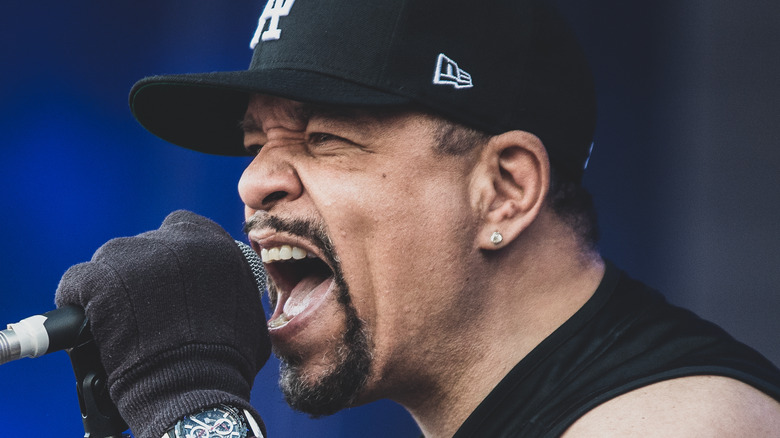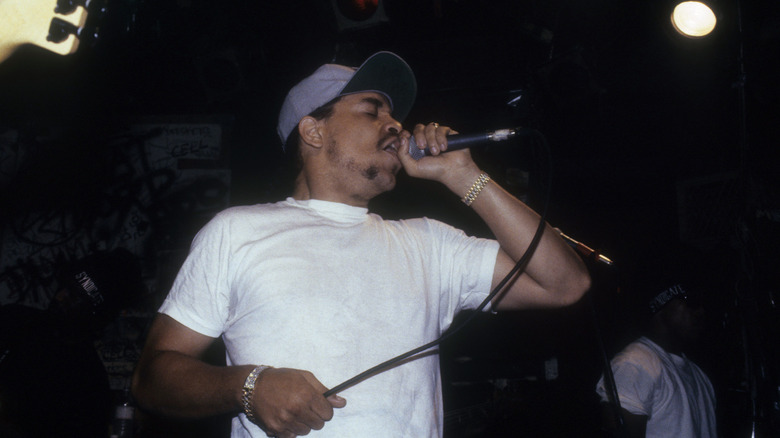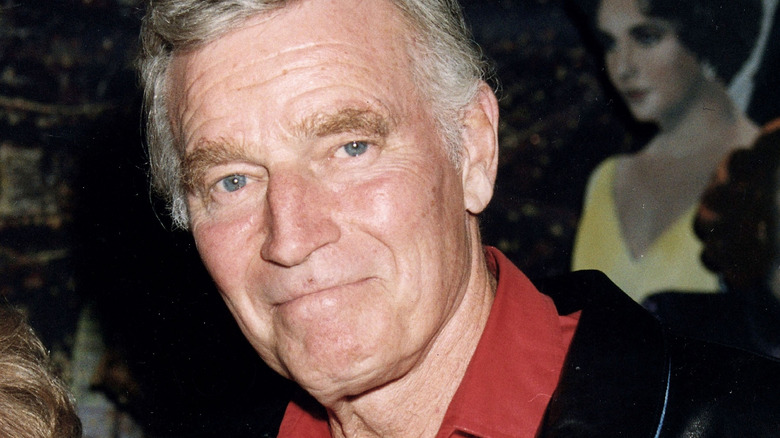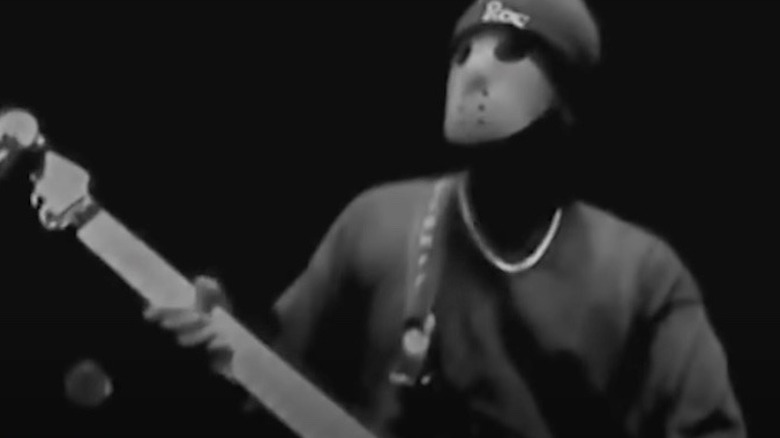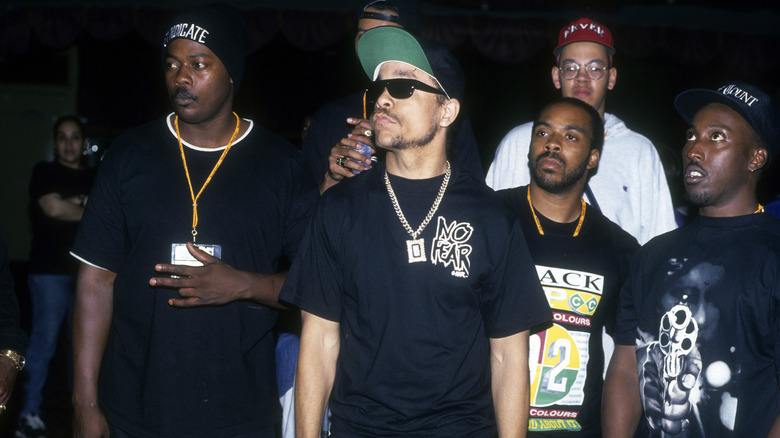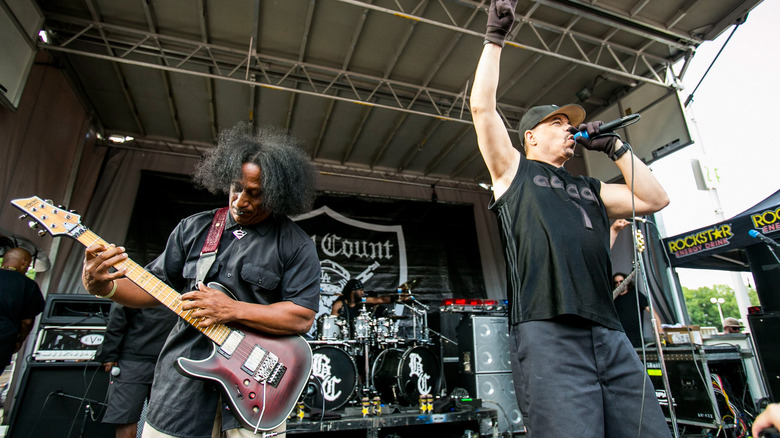The Untold Truth Of Body Count
Prior to Body Count, it was rather uncommon for Black musicians to dip their toes into the world of heavy metal. However, one Tracy Lauren Marrow, otherwise known as Ice-T, helped change that, having revealed in his autobiography, "Ice: A Memoir of Gangster Life and Redemption," that he had been a fan of rock music since his teenage years. By the early '90s, he was seeking to try something new after establishing himself as a big name in the rap scene, and with that in mind, he formed Body Count and included a rap-metal song of the same name on his 1991 album, "O.G. Original Gangster," with the new band backing him up. That summer, Body Count performed at the first-ever Lollapalooza, taking the stage after Ice-T performed half a set of his hip-hop songs as a solo artist.
You probably know what happened next — Body Count released their self-titled debut album in 1992, and the anti-police brutality track "Cop Killer" ruffled all sorts of feathers, angering parents, politicians, celebrities (more on that later), and not at all surprisingly, law enforcement officers across the U.S. Eventually, Ice-T felt the best thing to do was to remove the song from the album, but the "damage" had been done — Body Count was on the musical map and then some. Since then, they've had quite a productive, if occasionally challenging career, but given how most people nowadays recognize Ice-T for his work as a rapper, or for his oh-so-ironic role as a cop on "Law & Order: Special Victims Unit," there are several facts about the band that might not be too familiar to the casual listener.
The Body Count origin story
Body Count's members — frontman Ice-T, lead guitarist Ernie C (Ernie Cunnigan), rhythm guitarist D-Roc (Dennis Miles), bassist Mooseman (Lloyd Roberts III), and drummer Beatmaster V (Victor Wilson) — all attended Crenshaw High School in Los Angeles around the same time in the mid-to-late '70s. As Ice recalled in an interview with Revolver, Beatmaster V and Mooseman both sold drugs while in high school, with the former actually getting expelled from Crenshaw after getting caught selling marijuana by the school's security guards. Ernie C, meanwhile, was a kid from a particularly rough neighborhood who was building a reputation as a flashy guitar player, and D-Roc was one of his proteges.
More than a decade later, Ice-T came back from a trip to Europe with an interesting discovery — over there, audiences would mosh to "fast rap" songs like Public Enemy's "Bring The Noise." Being that moshing was far more associated with punk and heavy metal, Ice decided that it was about time for him to form a rock band. Fortunately, he was still in touch with his old high school buddies, and with that, Body Count was born.
Originally, the plan was for Body Count to be a side project that made music "for fun" on weekends (via Louder), but as they played more gigs and eventually got a spot at Lollapalooza '91, it became clear that this was going to be more than just a diversion for Ice-T when he wasn't busy rapping.
This legendary actor was not a fan of Body Count
He's Charlton Heston. You may remember him from the many movies in which he portrayed biblical characters. You may remember him for impassioned lines such as "You maniacs! You blew it up!" and the ominous warning "Soylent Green is people!" You may also remember him for the conservative causes he championed in the later years of his life. But do you remember the time he took offense to the lyrics of Body Count's songs?
It wasn't just "Cop Killer" that had particularly irked Heston during a meeting of Time Warner shareholders in 1992. Well, he was obviously bothered by "Cop Killer," and as The Washington Post reported, it was "strange" to hear him calmly recite lines such as "Die, die!/Die, pig, die!" and "F*** the police!" in his distinctive voice. He also took time to read the lyrics of "KKK B*tch," a sexually explicit tune where Ice-T sings about dating a woman whose father is the Grand Wizard of the Ku Klux Klan.
Commenting about Ice-T, Heston offered a backhanded compliment, saying that he doesn't have any ill will against a man who's "trying for his 15 minutes of fame." However, he was clearly unhappy with Time Warner for what he felt was a lax response to Body Count's self-titled debut album, as well as the band's body bag-inspired promotional material. For his part, company spokesman Ed Adler explained that these were promotional items for an "anti-drug song which talked about kids coming home in body bags," and not in any way meant to look like body bags for dead police officers.
The reason why D-Roc wore a hockey mask
Better known by his stage name D-Roc the Executioner, or just plain D-Roc, Dennis Miles was Body Count's original rhythm guitarist, and it was impossible to miss him on-stage. Unlike the rest of the band, D-Roc opted to wear a hockey mask while performing, almost making him look like a thrash metal version of Jason Voorhees. But what was the story behind that mask? Was it a tribute to an iconic horror movie villain or some sort of gimmick he chose to set himself apart from other guitarists — or his other bandmates?
As it turns out, it was neither of those things. According to lead guitarist Ernie C, D-Roc wore the mask on-stage (and even off-stage) simply because he was shy and didn't want to be recognized as a famous guitarist. "He didn't want to be a star," Ernie C told Rolling Stone. "He didn't want people to know his face. He just enjoyed playing the music."
D-Roc was only 45 years old when he died due to complications from lymphoma on August 17, 2004. Sadly, he was not the only Body Count member to pass away in recent years at the time of his death.
Most of the band's original members died within an eight-year period
There are only two members from Body Count's original lineup who remain with the band to this day — Ice-T and Ernie C. Tragically, the reason behind this is that the three other men whom Ice introduced on-stage at Lollapalooza '91 died within an eight-year period.
The first original member who died was drummer Beatmaster V, who died of leukemia on April 30, 1996. During the making of the band's 1997 album "Violent Demise: The Last Days," Jonathon James filled in on drums on several songs, as noted on the album's Discogs page. Almost four years later, on February 22, 2001, bassist Mooseman, who left Body Count before they entered the studio to record "Violent Demise," was killed in a drive-by shooting in Los Angeles. At the time of his death, he was part of Iggy Pop's backing band, and had just contributed bass parts to the Godfather of Punk's 13th album, "Beat 'Em Up."
Then there was D-Roc, who, as mentioned above, died in 2004, becoming the third classic Body Count member to pass away. Ice-T later commented on his longtime friend's death, describing it in an interview as a very "emotional" moment. "We were in the middle of making a new record together and he goes and dies? It was like, 'damn!' Soon enough, though, everybody was like, 'c'mon, c'mon, you gotta do it.' It was make-or-break," he continued.
Their recent albums have featured tons of collaborations
They may not have recorded anything close to being as controversial as "Cop Killer" was back in the day. However, Body Count is still going strong and consistently releasing new music, with Ice-T and Ernie C joined by rhythm guitarist Juan of the Dead (Juan Garcia), bassist Vincent Price (Vincent Dennis), drummer Ill Will (Will Dorsey), and backing vocalists Sean E Sean and Little Ice (Tracy Marrow Jr.) — that's Ice-T's kid, in case the name sounds familiar. They've also gotten a who's who of heavy music to join them in the studio for collaborations on their recent albums.
Just who has teamed up with Body Count on their last two releases? For 2017's "Bloodlust," Dave Mustaine of Megadeth, Max Cavalera of Soulfly (formerly of Sepultura), and Randy Blythe of Lamb of God all guested on the album, which also happened to include a slightly re-titled cover of Slayer's "Raining Blood" — sorry, no Tom Araya guest vocals on that particular track, though. As for 2020's "Carnivore," that album featured guest performances from Evanescence's Amy Lee, Hatebreed's Jamey Jasta, and the late Riley Gale of Power Trip. That's a whole lot of talent on two albums, and more proof that Body Count has built quite the legacy as that metal band formed and fronted by a rap superstar.
